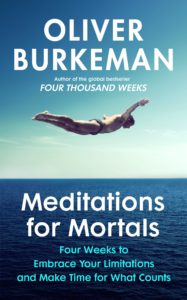 This is a book about how the world opens up once you realise you’re never going to sort your life out. It’s about how marvellously productive you become once you give up the grim-faced quest to make yourself more and more productive; and how much easier it gets to do bold and important things once you accept that you’ll never get around to more than a handful of them (and that, strictly speaking, you don’t need to do any of them at all). It’s about how absorbing, even magical, life becomes when you accept how fleeting and unpredictable it is; how much less isolating it feels to stop hiding your flaws and failures from others; and how liberating it can be to understand that your greatest difficulties in life might never be fully resolved.
This is a book about how the world opens up once you realise you’re never going to sort your life out. It’s about how marvellously productive you become once you give up the grim-faced quest to make yourself more and more productive; and how much easier it gets to do bold and important things once you accept that you’ll never get around to more than a handful of them (and that, strictly speaking, you don’t need to do any of them at all). It’s about how absorbing, even magical, life becomes when you accept how fleeting and unpredictable it is; how much less isolating it feels to stop hiding your flaws and failures from others; and how liberating it can be to understand that your greatest difficulties in life might never be fully resolved.
I worked in a bookshop for over 24 years, and over that time a mighty river of self-help titles flowed past me. The books ranged from the po-faced spiritual to the (arguably) scientific with a steady stream of faddish nonsense in between. I used to sample them, and it must have been primarily to torture myself. Because (though there were always a few useful ideas, even in the most idiotic), after reading them I always felt cross/grumpy/enraged/disbelieving. Rarely did they reflect life as I lived it. I have never possessed supernatural powers of concentration, self-discipline and willpower. Life, being unpredictable, predictably got in the way of the best plans for increased productivity, focus, personal growth, fitness and (yes, I’ll admit it) weight loss. All those charts, lists, schedules and reminders ended up feeling both joyless and ultimately useless.
So Oliver Burkeman’s The Antidote: Happiness for People Who Can’t Stand Positive Thinking was a cheering entrant into the crowded field. I enjoyed his highly sceptical take on the whole project. His next book, 4,000 Weeks: Time and How To Use It clarified his central message. Which is that life is short, and we are never going to have the time to do all the things we think we must, should, need and want to do. Becoming more productive is a trap, because, for example, the more quickly we respond to emails, the more incoming emails come pinging into our inboxes. Checking off items on a long ‘to-do’ list only frees up time to make the list longer. Some of Burkeman’s ideas from that book I follow still. Embrace your limitations, and this includes the limitations of human life. It’s short. We can’t predict our futures. Anything can happen, at any time, to anyone. Abandon perfection. Rediscover the power of rest. And, very practically for a writer, write only 3 to 4 hours in a day.
Burkeman’s new book, Meditations for Mortals: Four Weeks to Embrace Your Limitations and Make Time for What Counts is a distillation of what he’s learned over the years of his quest to make better use of his time. He suggests that we abandon not only perfectionism, but those fantasy visions of your best life, your best self, your ideal existence. Because it’s never going to happen. I’ve already tried some of his practical advice – like practising ‘scruffy hospitality’, where you don’t clean the house from top to bottom before guests arrive, and eat a gourmet meal off matched plates with ironed table napkins. And I enjoy the excursions into religion, philosophy and spirituality which underpin much of his writing.
I highly recommend this book to all anxious over-achievers like me.

I like the sound of this a lot! Very sensible.